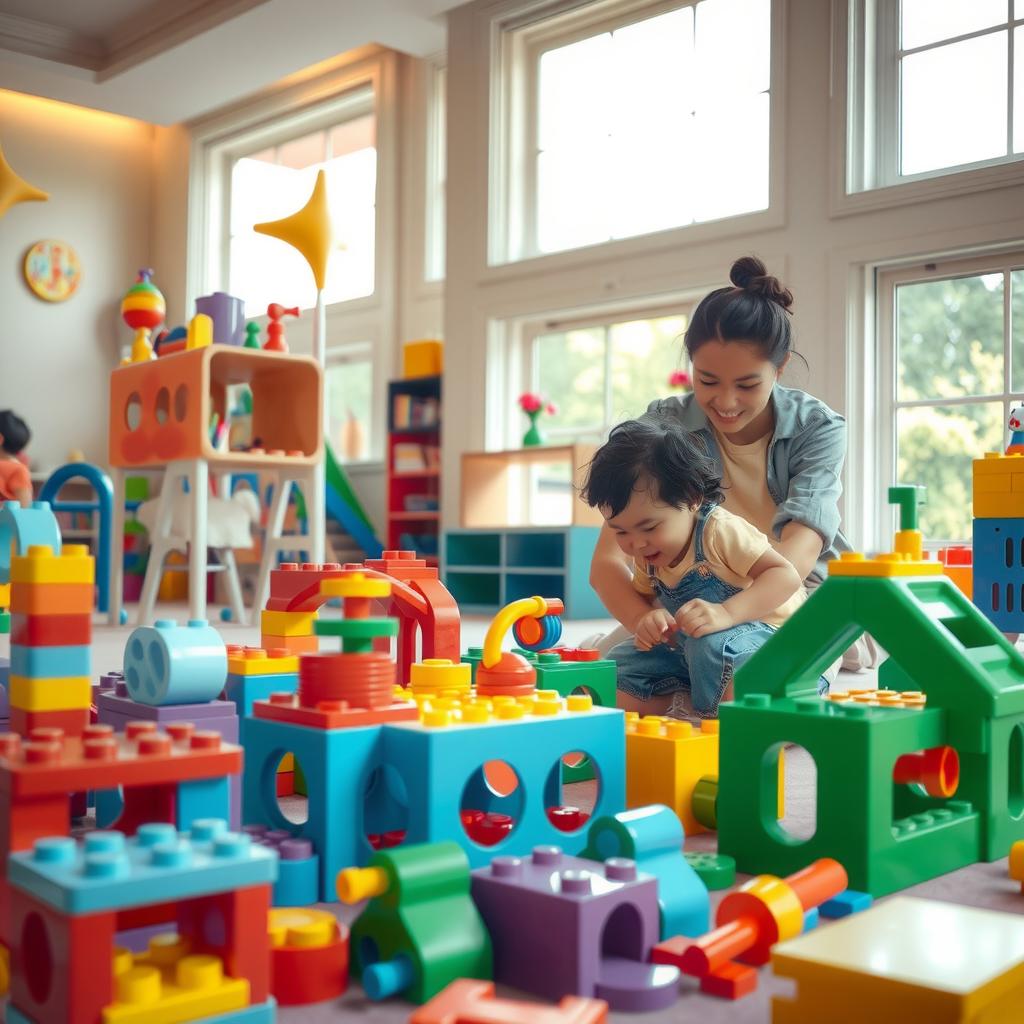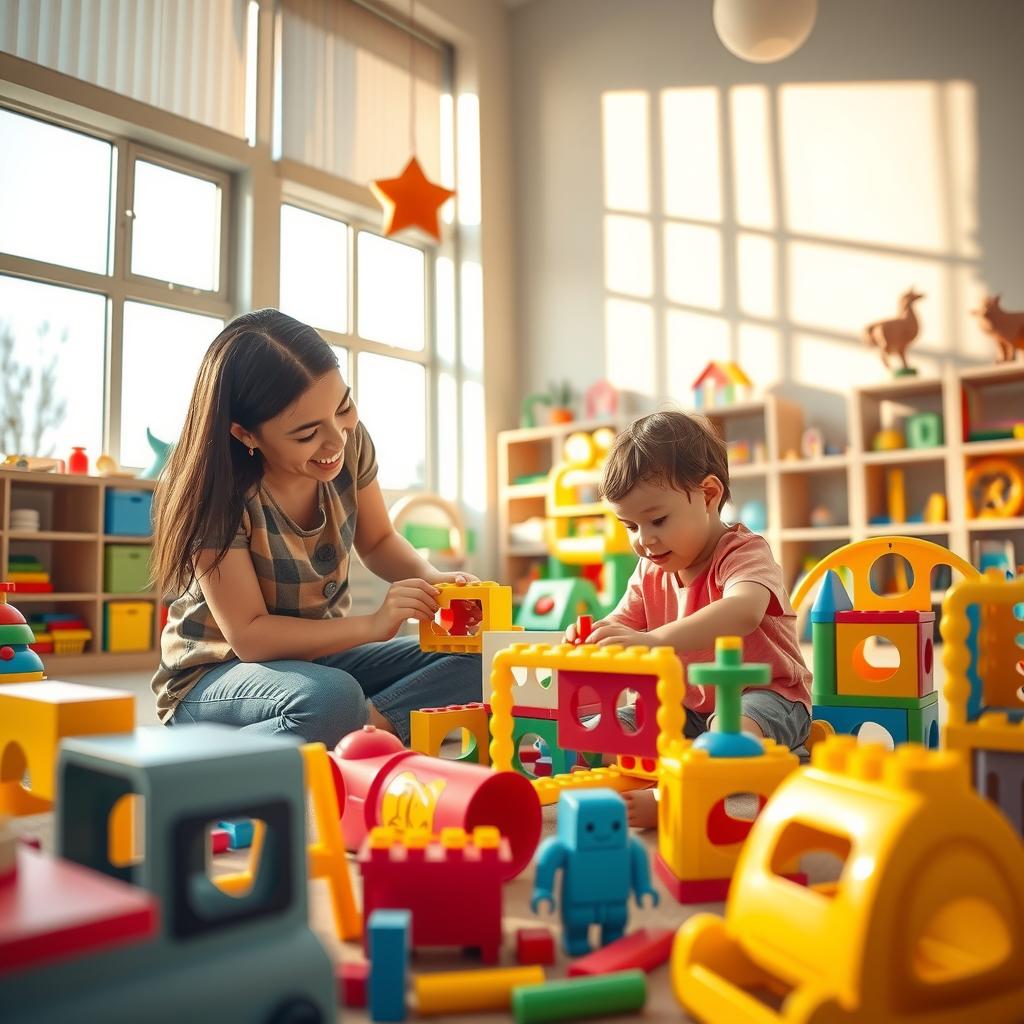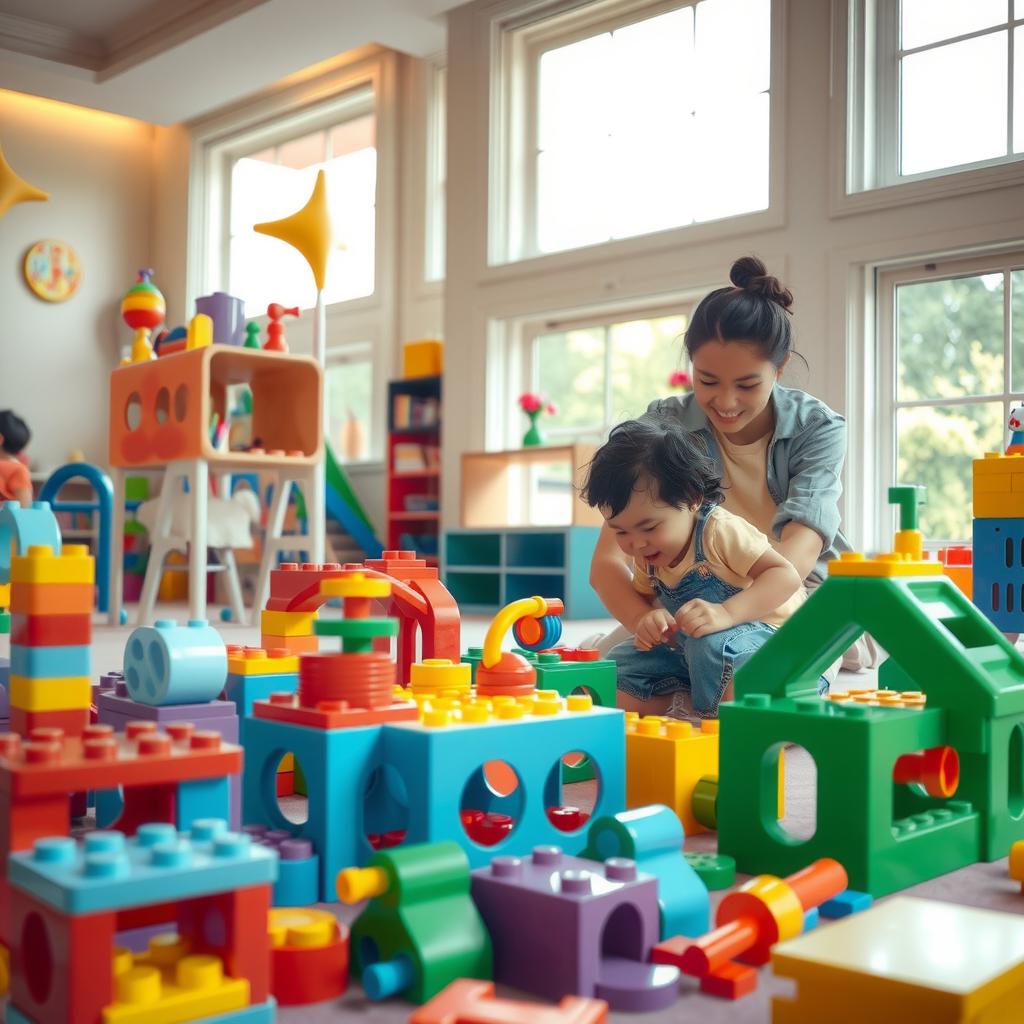In today’s fast-paced world, many parents find themselves struggling to carve out quality time with their children, often resorting to passive forms of entertainment that do little to foster true connection or development. This phenomenon raises a critical question: how can families create meaningful interactions that promote both cognitive growth and emotional bonding? The answer lies in the practice of structured parent-child play, particularly in indoor environments where distractions are minimal, and creativity can flourish. Engaging in organized activities not only enhances parent-child interaction but also serves as a powerful tool for learning through play.
The core value of structured play is its multifaceted impact on child development, bridging gaps between fun and education. Through planned games and activities tailored to a child’s interests and abilities, families can cultivate an environment rich in exploration and discovery. These experiences significantly contribute to fostering essential skills such as problem-solving, communication, and even social awareness—elements crucial for navigating today’s complex world. Moreover, these shared moments allow parents to actively participate in their child’s learning journey while reinforcing family bonds.
As parents seek effective ways to enhance their engagement with their children indoors—especially during inclement weather or busy schedules—they may find themselves overwhelmed by the myriad options available. However, harnessing the benefits of structured play provides a clear solution that addresses both developmental needs and emotional connections within the family unit. By incorporating intentional activities into daily routines—not merely relying on screen time or unplanned leisure—the potential for enriching relationships emerges alongside significant developmental milestones.
Exploring the numerous advantages associated with structured parent-child play illuminates pathways toward stronger familial ties while supporting holistic child growth. In this article, readers will discover how embracing this approach not only transforms everyday interactions into valuable lessons but also nurtures lasting memories steeped in joy—all within the comfort of home’s four walls. Join us as we delve deeper into these remarkable insights surrounding indoor play benefits, recognizing its vital role in shaping resilient futures for our youngest generation.

Key Points:
-
The Significance of Structured Play: Enhancing Family Dynamics
Structured play serves as a vital tool in fostering parent-child interaction by creating opportunities for families to engage meaningfully. It helps bridge the gap that modern distractions often create, allowing parents and children to connect on a deeper emotional level while participating in enjoyable activities together. -
Promoting Child Development Through Engagement: Learning via Play
Research underscores the importance of learning through play, which is integral to child development. When parents actively participate in structured activities, they not only support cognitive growth but also nurture creativity and problem-solving skills. These experiences allow children to express themselves freely while benefiting from real-time reinforcement of learning concepts. -
Transforming Indoor Spaces into Nurturing Environments: The Benefits of Indoor Activities
Indoor environments can be transformed into vibrant spaces filled with joy and connection through well-designed structured activities. Engaging in interactive games or creative projects fosters teamwork and imagination, enhancing both emotional bonding and physical development within families. By prioritizing these intentional interactions, parents contribute positively towards their children’s resilience and communication skills during everyday challenges.

The Importance of Quality Time
Understanding the Disconnect in Modern Family Interactions
In today’s fast-paced world, family bonding often takes a backseat to the demands of modern life. With parents juggling work responsibilities, social commitments, and other obligations, meaningful interactions with children can become scarce. This disconnect is particularly concerning as it hinders essential parent-child interaction, which is crucial for emotional and cognitive development during formative years. Experts emphasize that nurturing strong relationships within families requires intentional efforts to prioritize quality time together. Engaging with children through shared activities not only fosters deeper emotional connections but also enhances their overall growth.
The benefits of engaging in indoor play cannot be overstated; these moments serve as invaluable opportunities for learning through play while reinforcing the parent-child bond. Research indicates that when parents participate in games or creative projects with their kids, they facilitate critical thinking skills and problem-solving abilities—key components of cognitive growth. Furthermore, such interactions allow children to express themselves freely while receiving guidance from their caregivers, thus cultivating an environment where both parties feel secure and valued.
Modern distractions like smartphones and streaming services can exacerbate familial disconnection if not managed properly. A significant number of families find themselves physically present yet emotionally distant due to screens dominating attention spans during supposed family time. Setting aside dedicated periods for undistracted interaction—whether through board games or storytelling sessions—can significantly enhance conversations between parents and children. The simplicity of playing a game together can lead to discussions about emotions or challenges faced at school, further strengthening those vital emotional ties.
Moreover, establishing routines that incorporate family activities is instrumental in promoting consistent engagement among family members. For instance, dedicating weekends to outdoor adventures or themed movie nights allows everyone involved to look forward to these moments eagerly—a practice that reinforces commitment towards nurturing relationships over time. Such practices help instill values like teamwork and cooperation within young minds while simultaneously serving as a platform for parents to model healthy communication styles.
Ultimately, recognizing the importance of nurturing strong parent-child bonds amidst daily chaos is fundamental for long-term well-being within families today. As research continues revealing how detrimental neglecting quality time can be on child development across various domains—including social skills—the call remains urgent: Families must make conscious efforts toward enhancing interaction levels at home by creating opportunities rich in love and support rather than letting everyday tasks overshadow them entirely.
In conclusion, understanding how modern life impacts familial dynamics sheds light on why prioritizing quality time becomes paramount amidst growing distractions prevalent today—it ultimately lays down foundations necessary not just for enhanced emotional connections, but also thriving childhoods ripe with potential successes ahead!
Structured Play: A Key to Child Development
The Essence of Engaging Activities
Structured play emerges as a pivotal component in fostering emotional connections and enhancing cognitive growth among children. Through well-designed indoor activities, parents can create an environment that promotes meaningful interactions, laying the groundwork for holistic development. Engaging in structured play not only allows children to explore their creativity but also strengthens family bonds. As they navigate through various games and challenges together, both parents and children experience a shared journey of discovery that deepens their emotional ties.
Enhancing Emotional Connections
One significant advantage of structured play is its ability to enhance emotional connections between parents and children. During these interactive sessions, there are ample opportunities for open communication, which fosters trust and understanding. For instance, when families engage in cooperative games or storytelling activities indoors, they create cherished memories while navigating emotions such as joy, frustration, or excitement together. These shared experiences become building blocks for healthier relationships over time—reinforcing the notion that love and support are ever-present within the family unit.
Fostering Cognitive Growth
In addition to strengthening relationships, structured play serves as a powerful tool for promoting cognitive growth in young minds. Through thoughtfully curated activities such as puzzles or educational board games designed specifically for indoor settings, children can develop critical thinking skills while having fun with their loved ones. Parents who actively participate witness first-hand how playful learning stimulates curiosity; questions arise naturally during exploration which encourages deeper engagement with concepts such as numbers or language skills without it feeling like work at all—transforming potential academic challenges into enjoyable experiences through learning through play.
Unlocking Creativity
Beyond emotional bonding and cognitive enhancement lies the remarkable capacity of structured play to unlock children’s inherent creativity—a vital aspect often overlooked by adults preoccupied with traditional educational methods. When immersed in imaginative role-playing scenarios alongside caregivers during indoor sessions filled with art supplies or costumes—a child is empowered to express themselves freely without fear of judgment! Herein lies an opportunity where boundaries blur between reality & fantasy igniting innovative ideas that might blossom into future endeavors—from artistry pursuits down paths leading toward scientific discoveries later on.
In conclusion (not included per instructions), embracing structured play cultivates valuable parent-child interactions essential for nurturing healthy emotional connections while simultaneously unlocking avenues leading towards positive cognitive outcomes alongside creative expression—an indispensable trifecta contributing significantly towards comprehensive childhood development within familial contexts today!
Creating Joyful Spaces
Cultivating Environments That Foster Connection and Growth
Transforming indoor spaces into nurturing environments is essential for promoting holistic child development. Parents can create areas that inspire structured play through thoughtful design, thereby enhancing opportunities for parent-child interaction. For instance, dedicating a corner of the living room to interactive activities such as building blocks or arts and crafts can significantly elevate the quality of time spent together. This space should be visually engaging; using bright colors and textured materials stimulates children’s senses while encouraging creativity. By integrating elements that promote learning through play, parents foster an atmosphere where children feel safe to explore their imagination. Furthermore, incorporating items like cushions or soft rugs allows for comfortable seating arrangements that encourage longer engagement in these activities.
The Importance of Play Areas
Designing Spaces That Encourage Exploration
Establishing designated play areas within homes not only enhances indoor play benefits, but also nurtures a sense of belonging among family members. A well-organized space filled with diverse toys—such as puzzles, books, and games—can stimulate children’s cognitive growth while reinforcing important skills like problem-solving and teamwork during family bonding moments. When parents actively participate in these playful endeavors, they strengthen emotional connections with their children; this shared experience helps build trust and communication skills crucial for future interactions. Moreover, creating zones specifically aimed at different types of play—whether physical activity or imaginative role-play—allows each child’s unique interests to flourish without interruption from other distractions.
Elements That Enhance Learning
Incorporating Educational Tools Into Everyday Life
Incorporating educational tools into indoor spaces can further enhance learning experiences tailored towards individual developmental stages. Items such as alphabet mats or number charts can provide visual cues that promote literacy and numeracy skills during spontaneous moments of exploration at home. Additionally, setting up a mini-library stocked with age-appropriate books creates a cozy reading nook where children are encouraged to engage in storytelling sessions either alone or alongside caregivers who model enthusiasm for reading aloud—a practice known to boost language acquisition effectively! By surrounding children with resources that invite curiosity about the world around them, parents facilitate profound discoveries leading toward emotional stability as well as intellectual enrichment.
Transformative Family Rituals
Building Lifelong Memories Through Intentional Design
Creating routines centered on intentional play transforms mundane daily tasks into cherished family rituals capable of leaving lasting memories while fostering deep connections among loved ones over time. For example, designating specific evenings each week for board games encourages both laughter and collaboration—all vital components contributing positively towards emotional intelligence development within youth populations today! As families gather around tables adorned with snacks prepared together beforehand—it reinforces shared responsibility & teamwork whilst simultaneously emphasizing healthy habits learned early on regarding nutrition choices made collectively throughout childhood years ahead! Ultimately these transformative strategies empower families everywhere striving towards creating nurturing environments conducive not just solely focused upon academics but rather encompassing the whole spectrum involved within wholesome upbringing journeys undertaken collectively thus far.
Frequently Asked Questions:
Q: What is structured play and why is it important for parent-child interaction?
A: Structured play refers to planned activities that are intentionally designed to engage children and parents in meaningful ways. This type of play is crucial for enhancing parent-child interaction, as it provides a framework within which families can bond, learn together, and create joyful memories. Through these interactions, parents can foster emotional connections while also supporting their children’s cognitive growth.
Q: How can indoor play benefit child development?
A: Engaging in indoor activities through structured play offers numerous benefits for child development. These activities promote creativity, problem-solving skills, and self-expression. Furthermore, they provide opportunities for parents to model positive behaviors and reinforce essential learning concepts during the process of playing together. As a result, children develop not only intellectually but also emotionally through these engaging experiences.
Q: In what ways does structured parent-child play enhance family bonding?
A: Structured parent-child activities create an environment that nurtures strong family bonds by encouraging open communication and shared experiences. Families who prioritize this time often find themselves enjoying laughter together while navigating challenges collaboratively. This intentional focus on meaningful interactions fosters deeper emotional connections among family members and lays the groundwork for lasting relationships built on trust and understanding throughout their lives.

